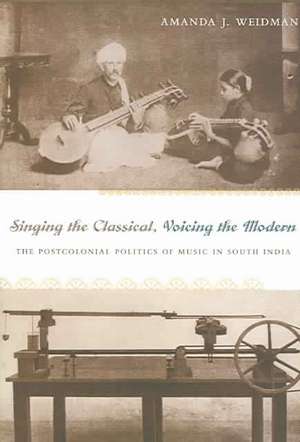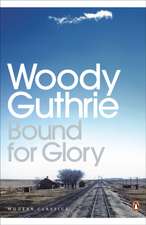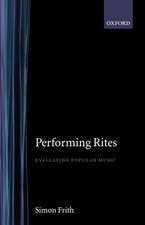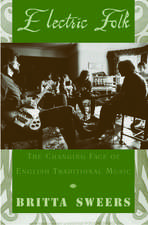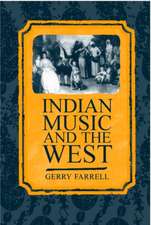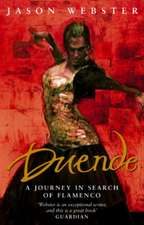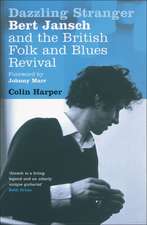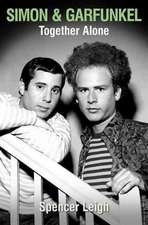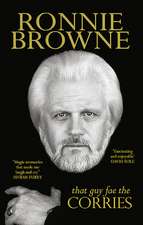Singing the Classical, Voicing the Modern
Autor Amanda J. Weidmanen Limba Engleză Paperback – 14 aug 2006
Preț: 301.59 lei
Nou
Puncte Express: 452
Preț estimativ în valută:
57.71€ • 60.41$ • 48.03£
57.71€ • 60.41$ • 48.03£
Carte tipărită la comandă
Livrare economică 31 martie-14 aprilie
Preluare comenzi: 021 569.72.76
Specificații
ISBN-13: 9780822336204
ISBN-10: 0822336200
Pagini: 349
Ilustrații: 34 illustrations
Dimensiuni: 154 x 227 x 22 mm
Greutate: 0.51 kg
Editura: Duke University Press
Locul publicării:United States
ISBN-10: 0822336200
Pagini: 349
Ilustrații: 34 illustrations
Dimensiuni: 154 x 227 x 22 mm
Greutate: 0.51 kg
Editura: Duke University Press
Locul publicării:United States
Recenzii
Singing the Classical, Voicing the Modern is a brilliant critique of the emergence of Karnatic music as a classical art during the nineteenth and early twentieth centuries. Situating her account within modernist and colonialist discourses of the authentic subject, Amanda J. Weidman explores a broad range of sources, from little-known early-twentieth-century Indian texts (in Tamil, Sanskrit, and Telugu) to contemporary studies in anthropology and musicology to feminist and media theory.Katherine Bergeron, author of Decadent Enchantments: The Revival of Gregorian Chant at SolesmesAmanda J. Weidman brilliantly turns the tables on ideologies of voice in challenging us to envision music as constituting technologies for producing voices. Ethnomusicology, anthropology, postcolonial studies, and critical histories of technology all take a step forward as a genealogy of Indian classical music engenders new insights into colonialism, nationalism, gender, traditionality, and modernity.Charles L. Briggs, Professor of Anthropology, University of California, Berkeley
Notă biografică
Amanda J. Weidman is Assistant Professor of Anthropology at Bryn Mawr College.
Textul de pe ultima copertă
"Amanda J. Weidman brilliantly turns the tables on ideologies of voice in challenging us to envision music as constituting technologies for "producing" voices. Ethnomusicology, anthropology, postcolonial studies, and critical histories of technology all take a step forward as a genealogy of Indian 'classical' music engenders new insights into colonialism, nationalism, gender, traditionality, and modernity."--Charles L. Briggs, Professor of Anthropology, University of California, Berkeley
Cuprins
List of Illustrations xii
Acknowledgements ix
Note on Transliteration of Spelling xvii
Introduction 1
1. Gone Native?: Travels of the Violin in South India 25
2. From the Palace to the Street: Staging “Classical” Music 59
3. Gender and the Politics of Voice 111
4. Can the Subaltern Sing?: Music, Language, and the Politics of Voice 150
5. A Writing Lesson: Musicology and the Birth of the Composer 192
6. Fantasic Fidelities 245
Afterword: Modernity and the Voice 286
Notes 291
Works Cited 325
Index 343
Acknowledgements ix
Note on Transliteration of Spelling xvii
Introduction 1
1. Gone Native?: Travels of the Violin in South India 25
2. From the Palace to the Street: Staging “Classical” Music 59
3. Gender and the Politics of Voice 111
4. Can the Subaltern Sing?: Music, Language, and the Politics of Voice 150
5. A Writing Lesson: Musicology and the Birth of the Composer 192
6. Fantasic Fidelities 245
Afterword: Modernity and the Voice 286
Notes 291
Works Cited 325
Index 343
Descriere
Reveals how Karnatic music emerged as Indias classical music through a particular politics of voice that developed in the crucible of colonial modernity, nationalist ideology, and South Indian regional politics.
